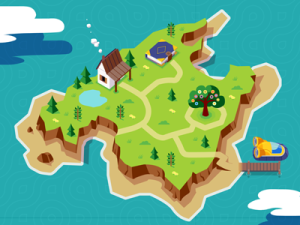Developing strong learning strategies can help people with disabilities succeed in college, job training, and other education programs. These strategies improve understanding, memory, and overall learning. This checklist highlights important skills that can make learning easier and more effective. These strategies can support students in transition programs, college or vocational training, as well as personal learning, job training, and lifelong education.
This “Learning Independently” checklist from Independent Futures that Work can be used to mark off skills as they are mastered, as a transition assessment for postsecondary education and training, and to develop Individualized Education Program (IEP) goals for skills still to be mastered. The checklist identifies learning strategies for the following areas:
Educators are invited to sign up for a pilot using Future Quest Island Explorations. FQI-E helps students discover science, technology, engineering, art, and math (STEAM) careers, set goals, and create individualized portfolios. Learn more on our Future Quest Island webpage.

Guardianship or alternatives: Choosing what is best is highly individualized.
Tips for young people with disabilities on effective strategies for building their first resume.

Learn how Pre-Employment Transition Services (Pre-ETS) help students with disabilities get ready for jobs.
Learn about the differences between high school and college degree programs and what laws protect students with disabilities.
Students with disabilities receive different levels of support at college than they did in high school. Read this fact sheet to learn more!
Side by side comparison to understanding the differences between secondary and postsecondary education.
Standard print, large print, Spanish, and braille ready are available.
Standard Print, large print, Spanish, and braille ready options available.
Increase effective middle school career development practices and expectations for students with complex disabilities.
Standard print, large print, Spanish, and braille ready are available.
O*NET is the main resource in the U.S. for information about different jobs and careers.
Explore careers, take assessments, create education plans, and connect with employers online.
Explore resources for succeeding during and after high school, including financial aid, careers & more.
Visit OK Edge to learn more about Individual Career and Academic Planning.
Check out the library! It’s free, fun, and full of resources to help youth succeed!
This website page from PACER has free downloads on many transition topics.
Check out these resources about Oklahoma IPSE non-degree college programs!
Helps teachers use Universal Core vocabulary for students with cognitive disabilities and communication needs.
This document compares transition services requirements for Education, Vocational Rehabilitation (VR), and Pre-Employment Transition Services.
These tools help students and families envision a good life and identify necessary supports.
This is the Policy Guide on Transition from Office of Special Education and Rehabilitative Services.
The Virtual College Campus Tour was created to help teens explore the world of post-secondary education through the comforts of home. This virtual college campus tour can help students discover and explore the many different types of higher education institutions available and answers the questions a student with a disability needs to ask to have a successful experience.
This brief outlines strategies to develop and implement work-based learning for students with complex needs.
This website offers a comprehensive suite of workplace readiness training resources designed to support a wide range of learning needs. It features interactive activities and instructional materials that can be easily filtered by skill area, disability type, and other relevant categories. Trainings cover essential skills such as financial literacy, money management, communication, and other key competencies needed for success in the workplace.